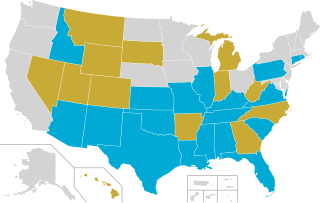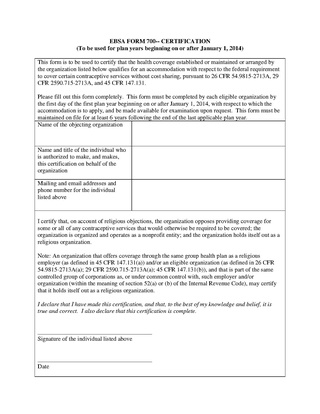
The Religious Freedom Restoration Act of 1993, Pub. L. No. 103-141, 107 Stat. 1488, codified at 42 U.S.C. § 2000bb through 42 U.S.C. § 2000bb-4, is a 1993 United States federal law that "ensures that interests in religious freedom are protected." The bill was introduced by Congressman Chuck Schumer (D–NY) on March 11, 1993. A companion bill was introduced in the Senate by Ted Kennedy (D-MA) the same day. A unanimous U.S. House and a nearly unanimous U.S. Senate—three senators voted against passage—passed the bill, and President Bill Clinton signed it into law.

Hobby Lobby Stores, Inc., formerly Hobby Lobby Creative Centers, is an American retail company. It owns a chain of arts and crafts stores with a volume of over $5 billion in 2018. The chain has 1,001 stores in 48 U.S. states. The Green family founded Hobby Lobby to express their evangelical Protestant beliefs and the chain incorporates American conservative values and Christian media.
The Little Sisters of the Poor is a Roman Catholic religious institute for women. It was founded by Jeanne Jugan. Having felt the need to care for the many impoverished elderly who lined the streets of French towns and cities, Jugan established the congregation to care for the elderly in 1839.
Conscience clauses are legal clauses attached to laws in some parts of the United States and other countries which permit pharmacists, physicians, and/or other providers of health care not to provide certain medical services for reasons of religion or conscience. It can also involve parents withholding consenting for particular treatments for their children.
Becket, also known as the Becket Fund for Religious Liberty, is a non-profit public interest law firm based in Washington, D.C., that describes its mission as "defending the freedom of religion of people of all faiths". Becket promotes accommodationism and is active in the judicial system, the media, and in education.
Eden Foods, Inc., is an organic food company based in Clinton, Michigan. It is best known for its Edensoy line of organic soy milk, and its line of organic Japanese foods and condiments. The company claims to be the oldest independent organic food producer in the United States, and the largest supplier of organic dry grocery items.
Religion and business have throughout history interacted in ways that relate to and affected one another, as well as influenced sociocultural evolution, political geographies, and labour laws. As businesses expand globally they seek new markets which leads to expanding their corporation's norms and rules to encompass the new locations norms which most often involve religious rules and terms.

Children's Healthcare Is a Legal Duty (CHILD) was from 1983 to 2017 an American nonprofit membership organization that worked to stop child abuse and neglect based on religious beliefs, cultural traditions, and quackery. CHILD opposed religious exemptions from child health and safety laws. These exemptions have been used as a defense in criminal cases when parents have withheld lifesaving medical care on religious grounds. These exemptions also have discouraged reporting and investigation of religion-based medical neglect of children and spawned many outbreaks of vaccine-preventable diseases and deaths. CHILD publicized the ideological abuse and neglect of children, lobbied for equal protection laws for children, and filed lawsuits and amicus curiae briefs in related cases.

The birth control movement in the United States was a social reform campaign beginning in 1914 that aimed to increase the availability of contraception in the U.S. through education and legalization. The movement began in 1914 when a group of political radicals in New York City, led by Emma Goldman, Mary Dennett, and Margaret Sanger, became concerned about the hardships that childbirth and self-induced abortions brought to low-income women. Since contraception was considered to be obscene at the time, the activists targeted the Comstock laws, which prohibited distribution of any "obscene, lewd, and/or lascivious" materials through the mail. Hoping to provoke a favorable legal decision, Sanger deliberately broke the law by distributing The Woman Rebel, a newsletter containing a discussion of contraception. In 1916, Sanger opened the first birth control clinic in the United States, but the clinic was immediately shut down by police, and Sanger was sentenced to 30 days in jail.

Birth control in the United States is available in many forms. Some of the forms available at drugstores and some retail stores are male condoms, female condoms, sponges, spermicides, over-the-counter progestin-only contraceptive pills, and over-the-counter emergency contraception. Forms available at pharmacies with a doctor's prescription or at doctor's offices are oral contraceptive pills, patches, vaginal rings, diaphragms, shots/injections, cervical caps, implantable rods, and intrauterine devices (IUDs). Sterilization procedures, including tubal ligations and vasectomies, are also performed.
A contraceptive mandate is a government regulation or law that requires health insurers, or employers that provide their employees with health insurance, to cover some contraceptive costs in their health insurance plans.
United States v. Lee, 455 U.S. 252 (1982), was a United States Supreme Court case establishing precedent regarding the limits of free exercise of religious conscience by employers.

State Religious Freedom Restoration Acts are state laws based on the Religious Freedom Restoration Act (RFRA), a federal law that was passed almost unanimously by the U.S. Congress in 1993 and signed into law by President Bill Clinton. The laws mandate that religious liberty of individuals can only be limited by the "least restrictive means of furthering a compelling government interest". Originally, the federal law was intended to apply to federal, state, and local governments. In 1997, the U.S. Supreme Court in City of Boerne v. Flores held that the Religious Freedom Restoration Act only applies to the federal government but not states and other local municipalities within them. As a result, 21 states have passed their own RFRAs that apply to their individual state and local governments.
Burwell v. Hobby Lobby Stores, Inc., 573 U.S. 682 (2014), is a landmark decision in United States corporate law by the United States Supreme Court allowing privately held for-profit corporations to be exempt from a regulation that its owners religiously object to, if there is a less restrictive means of furthering the law's interest, according to the provisions of the Religious Freedom Restoration Act of 1993. It is the first time that the Court has recognized a for-profit corporation's claim of religious belief, but it is limited to privately held corporations. The decision does not address whether such corporations are protected by the free exercise of religion clause of the First Amendment of the Constitution.
King v. Burwell, 576 U.S. 473 (2015), was a 6–3 decision by the Supreme Court of the United States interpreting provisions of the Patient Protection and Affordable Care Act (ACA). The Court's decision upheld, as consistent with the statute, the outlay of premium tax credits to qualifying persons in all states, both those with exchanges established directly by a state, and those otherwise established by the Department of Health and Human Services.
Zubik v. Burwell, 578 U.S. ___ (2016), was a case before the United States Supreme Court on whether religious institutions other than churches should be exempt from the contraceptive mandate, a regulation adopted by the United States Department of Health and Human Services (HHS) under the Affordable Care Act (ACA) that requires non-church employers to cover certain contraceptives for their female employees. Churches are already exempt under those regulations. On May 16, 2016, the Supreme Court vacated the Court of Appeals ruling in Zubik v. Burwell and the six cases it had consolidated under that title and returned them to their respective courts of appeals for reconsideration.

EBSA Form 700 is a form that the United States Government had required certain non-profit organizations to complete and submit, beginning January 1, 2014, in order to claim an exemption from the contraceptive mandate under the Affordable Care Act. After the U.S. Supreme court issued temporary injunctions, preventing any penalty against some non-profit institutions who objected to filing the form, the U.S. Department of Labor issued a new version of the form making it clear that organizations can, instead object by a letter.
Little Sisters of the Poor Saints Peter and Paul Home v. Pennsylvania, 591 U.S. ___ (2020), was a United States Supreme Court case involving ongoing conflicts between the Patient Protection and Affordable Care Act (ACA) and the Religious Freedom Restoration Act (RFRA) over the ACA's contraceptive mandate. The ACA exempts nonprofit religious organizations from complying with the mandate, to which for-profit religious organizations objected.
A religious exemption is a legal privilege that exempts members of a certain religion from a law, regulation, or requirement. Religious exemptions are often justified as a protection of religious freedom, and proponents of religious exemptions argue that complying with a law against one's faith is a greater harm than complying against a law that one otherwise disagrees with due to a fear of divine judgment. Opponents of religious exemptions argue that they mandate unequal treatment and undermine the rule of law.





